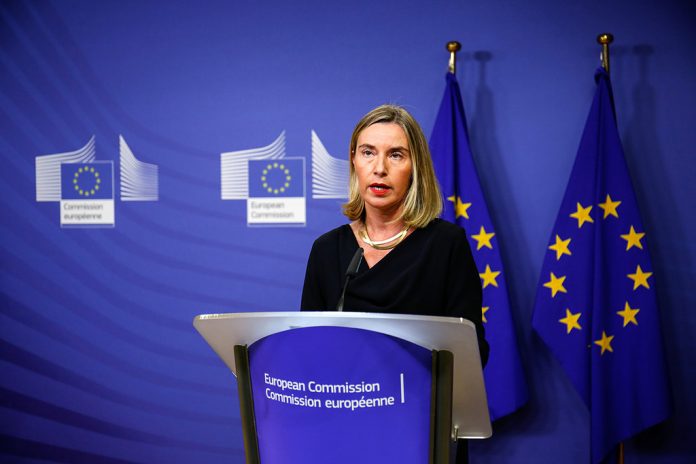The European Commission and the High Representative of the Union for Foreign Affairs and Security Policy today adopted a Joint Communication that sets out the EU’s vision for a strategy to strengthen cooperation and the partnership with India.
This Joint Communication replaces the last Commission Communication on India of 2004, recognising that India has emerged as the fastest-growing large economy and has acquired an important geopolitical role. The Communication aims to strengthen the EU-India Strategic Partnership by focusing on sustainable modernisation and on common responses to global and regional issues. It also seeks to reinforce the effectiveness of the EU’s external action and is coherent with the implementation of the Global Strategy.
“India is a key player in our interconnected world”, said High Representative/Vice-President Federica Mogherini. “We want to further reinforce our political, economic and people-to-people ties with India in order to address together global challenges, to promote together economic growth and to expand together business opportunities. The EU and India are committed to seize opportunities to support and promote effective multilateralism and solutions whenever peace and stability are in danger.”
Security through the rules-based global order
As an emerging global power, India plays a key role in the current multipolar world. To maintain the rules-based global order, therefore, it is vital that the EU and India implement effective multilateralism and global economic governance. The EU will seek to consolidate dialogue on multilateral issues, and to coordinate positions with India. Cooperation in the framework of the United Nations, the WTO and the G20 will be of priority.
The EU and India share common values and promote international peace and stability. The EU will work to engage India to promote common global agendas on human rights and democracy, data protection, gender equality and women’s empowerment and the inclusion of young people. Enhancing humanitarian coordination and developing joint actions on food security and disaster relief, would also bring clear added value.
The EU will seek regular exchanges and coordination with India on major foreign policy issues. Cooperation on security and defence policies will be enhanced in order to address together inter alia terrorism, cyber security, hybrid threats and maritime security. Crisis management ties, including military-to-military relations, will also be developed.
Prosperity through sustainable modernisation
The EU is a natural partner in supporting India’s sustainable growth. The EU’s expertise and technology in sustainable infrastructure development, transport regulatory
frameworks, circular economy, environmental protection and in digitalisation will further support India’s ongoing transition to a resource efficient economy and increase global connectivity. Enterprises will benefit from new business and investment opportunities.
The EU and India can do more jointly to tackle global challenges, such as climate change, environment protection, sustainable development, ocean governance, and work together on the effective implementation of the Paris Agreement. The EU will coordinate with India at the multilateral level. We will continue supporting the International Solar Alliance, and cooperate to facilitate the clean energy transition and to implement the Sustainable Development Goals, including through an enhanced cooperation in research and innovation.
The EU will continue to work with India towards comprehensive and balanced agreements on trade and investment and support a rules-based global trade regime. The EU will use all available channels and fora to ensure fair market access and predictable investment conditions in order to enhance trade and investment and unlock the potential of the two economies. The EU’s blending facilities will incentivise investment with a sustainable impact.
Talent and innovation will also be one of the priorities of the EU’s action. The EU will cooperate with India in order to foster the reciprocal mobility of students and researchers, and to consolidate networks of innovators and start-ups. Furthermore, the EU will move towards mutual recognition of qualifications and support exchanges between the respective cultural sectors. The EU will engage India on the issues of both legal and irregular migration, by using the existing tools to their full potential.
A more joined-up and streamlined approach towards India
The EU will seek more coordination between its initiatives and those of its Member States towards India. The EU and its Member States will work together to provide a better understanding of the EU in India. They will also work to make the EU’s public diplomacy more effective.
The EU will promote a strategic use of its funding instruments. Programmes for Indian diplomats and experts’ exchanges and dialogues will be multiplied in order to foster mutual understanding.
Finally, the Joint Communication proposes that the EU considers the possibility to negotiate with India a Strategic Partnership Agreement, in order to update the 1994 EU-India Cooperation Agreement.
The Joint Communication adopted today by the European Commission and the High Representative of the European Union for Foreign Affairs and Security Policy provides the elements for an EU strategy on India aiming at building a partnership for sustainable modernisation and the rules-based global order.
The proposals made in the Joint Communication will now be discussed in the European Parliament and the Council.

